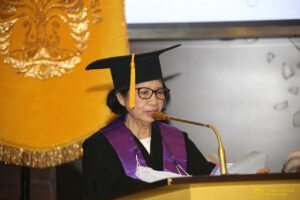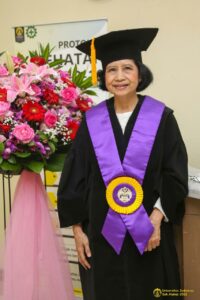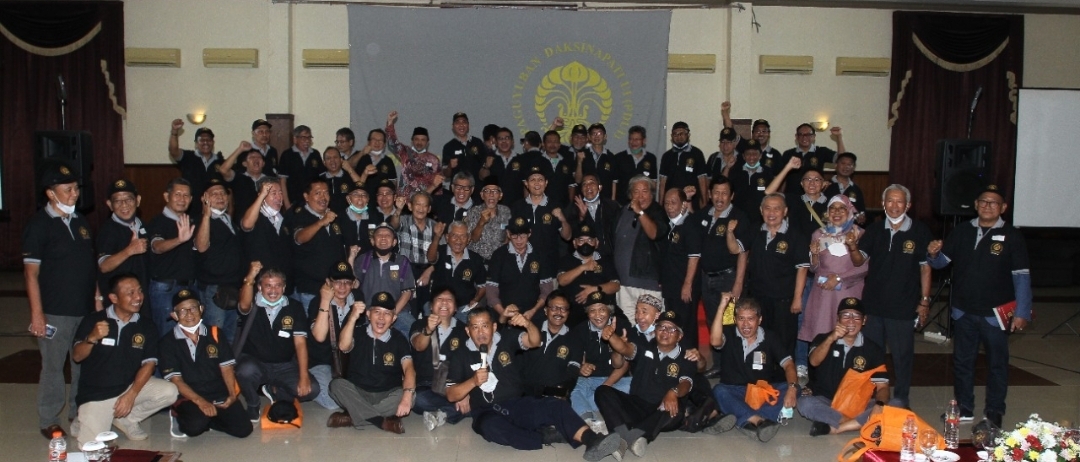
THERE IS A NEED FOR SPECIAL INSTITUTION TO MANAGE SOCIAL HEALTH DETERMINANTS TO ACTUALISE THE HEALTH EQUALITY
Indonesia has done several attempts to eliminate health disparities and improve the health system for more than a decade. If viewed from the classical theory of H.L Bloom there are four factors that affect the degree of individual or community health. These factors if sorted according to the magnitude of the influence on health include, (1) the environment; (2) behavior; (3) health services; and (4) genetics.
Prof. Dr. drg. Ella Nurlaella Hadi, M.Kes., delivering her inaugural speech as professor of the Faculty of Public Health (FKM) at Universitas Indonesia (UI) entitled “Developments and Challenges of Social Determinants of Health in Realizing Health Equality in Indonesia” (Wednesday, 21/12) , said that various studies in the last 30 (thirty) years identified that quality of life factors significantly affect the health of individuals and communities. The scope of living in a different socio-economic environment will have a different risk of health-illness and even death. Therefore, achieving health equity will be a big challenge for Indonesia.
“Various efforts have been made by the Indonesian government to eliminate health disparities including through changes in the health system in the last two decades which focus on improving the health service system, with a review of data and policy documents that show progress in the social determinants of health in Indonesia,” said Prof. Ella.
The progressive development of social determinants of health in Indonesia is indicated by four factors, which are the increasing participation in social protection, number of women’s representation in parliament, health financing, especially for primary health services, and increasing access to sanitation.
In her speech, Prof. Ella delivered various regulations and policies related to eliminating inequality and equity that have been implemented by the Indonesian government, such as eliminating gender, racial and ethnic discrimination, increasing women’s participation in national development, increasing the protection and rights of children and disabilities. In the health sector, there have been tobacco control regulations, the introduction of the National Health Insurance (JKN) scheme, eradicating stunting, raising the healthy community movement (GERMAS), establishing the COVID-19 Control Committee and recovering the national economy, as well as healthy cities and districts. These attempts were done in a collaboration with government and non-government institutions from the health sector and other sectors.
At the end of the speech, Prof. Ella stated that the challenge of social determinants of health in Indonesia is that government and non-government institutions in general do not understand the concept of social determinants of health, so that the links between social and health problems have not been studied comprehensively in formulating policies which results in policies that are still sectoral egos. For this reason, there needs to be a coordinator who can coordinate social issues in the health sector and the Coordinating Ministry for Human Development and Culture and the National Development Planning Agency are considered the right institutions to carry it out.
“In addition, the social determinant of health indicators monitoring in Indonesia has not been embodies specifically, because there is no institution that manages data on social determinants of health in Indonesia. At present monitoring of equity and equality gaps in Indonesia is only to describe trends and impacts of policies, national and local development programs and promotion of equity,” said Prof. Ella.
Thanks to this scientific study, Prof. Ella was confirmed as FKM UI Permanent Professor. The professor inauguration procession was led by UI Chancellor, Prof. Ari Kuncoro, S.E., M.A., Ph.D., at the UI Convention Center, Depok Campus, and broadcast virtually via the UI Youtube channel and UI TV. Also present at the inauguration ceremony, Chairperson of the Indonesian Dentists Association, Drg. Usman Sumantri, M.Sc; Chairman of the Association of Indonesian Public Health Promoters and Educators (PPPKMI), Dr. dr. Rita Damayanti, MSPH; Deputy Chairman of PPPKMI, Dr. Sarah Handayani, SKM, MKM; WFO Indonesia, dr. Fransiska Mardianingsih, MPH; Professor of FKM UI, Prof. Hasbullah Thabrani, MPH, DrPH; and the Dean of the Muhammadiyah HAMKA University Fikes, Ony Linda, SKM, MKM.

Prof. Ella studied Dentist Profession Program at UI in 1984, then she continued her Masters in Public Health at the same campus in 1994. After that, in 2007, she earned her Doctor of Public Health degree at UI. Throughout his career as a UI lecturer, he won several awards including the First Best Graduate of the Public Health Sciences Masters Program (1994); Cum Laude Predicate First Best Graduate Doctor of Public Health Program (2007); and two Satyalancana honors in 2001 and 2020. Various research and book works have been conducted and published in national journals, reputable international journals, and indexed international proceedings.
Several books and scientific papers published by Prof. Ella, among others, Public Health, Theory, Social and Behavior (2009); Community Practices of Newborn Care: Untapped Heritage and Local Wisdom from Indonesia (2012); Newborn Health Services in Garut Regency, West Java (2020); Health education to improve low-birthweight infant care practices in Central Jakarta, Indonesia (2022); Family Support for Medication Compliance in Tuberculosis Patients: Literature Review, Indonesian Health Promotion Publication Media (2022); and Parents’ Perceptions of Basic Immunizations During the Covid-19 Pandemic in Jakarta and Bekasi (2022).



